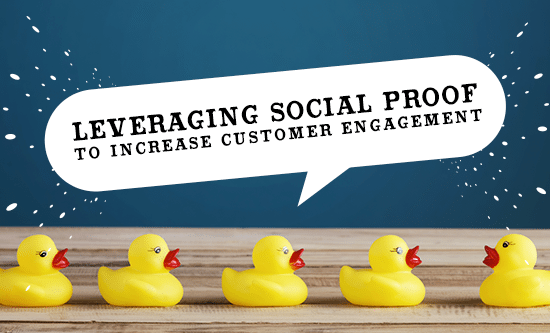Ever wonder why, when you’re out at a group dinner, several people decide to order the same meal, right down to identical side dishes and accompanying condiments? Perhaps everyone was attracted to the same dishes? It’s possible. More likely, however, some of the people in the group were unknowingly influenced by the concept of “social proof”. Social proof is a psychological phenomenon where people conform to the actions of others under the assumption that those actions reflect correct behaviour. Simply put, when we don’t know how to behave or what choices to make, we use the behaviour and choices of others as guidance. Social proof is such a pervasive influence in our everyday lives, therefore it is critical that marketers understand and know how to leverage it.
Over the years there have been many examples where social proof has been put to the test. One of the most famous cases of effective social proof marketing is by an American energy company called Opower. Several years ago, the company tried to lower energy usage and made one simple change to its customers’ bills, i.e. showing how much people’s neighbours were paying. As a result, overall energy usage per household dropped by 2% – an amazing change to behaviour with just a small amount of additional information provided to customers.
Similarly, when Northern Illinois University faced a binge drinking problem they decided to use social proof in a campaign with the simple message, “Most NIU students (55 percent) drink five or fewer drinks when they party”. It demonstrated that binge drinking was, in fact, not the social norm. As a result, excessive drinking among students nearly halved over a period of 10 years.
These are examples of how communication and behavioural change designers use social proof to amplify positive social norms, but social proof takes many forms. Here are some principles you can use to leverage social proof:
- Find an expert: by using an expert (eg. a doctor or professor) to talk about your product, you’ll gain more credibility.
- Use the power of a celebrity: most people dream of being rich, famous or admired. When consumers see someone they revere acting a certain way, it’s they’ll try to emulate them via their own spending.
- Show what others are doing: People are more likely to follow the decisions of other customers to avoid second-guessing their own decisions.
- Highlight crowd behaviour: the phrase “safety in numbers” also applies to customers. Why purchase an unknown brand when you know that millions have decided upon another one?
There are three main reasons why humans rely so heavily on social proof to dictate their actions:
- We dislike uncertainty: for example, to avoid having our holiday potentially spoiled by arriving at a “boutique guesthouse” that has just opened, most of us would rather choose a hotel where countless people have stayed before. In today’s digital age, online reviews and Facebook ‘likes’ are key.
- We like evidence: people understand numbers. The more numbers that substantiate your product, the more likely others are to follow. For example, a business that claims to have “1 million satisfied customers” is more likely to get repeat business compared to a business with only 5 TripAdvisor reviews.
- We like people that are similar to us: if people of a similar gender, occupation or even location have shown interest in something, it is more likely we will follow. Companies like Amazon and eBay use this particular strategy very effectively.
As you can see, social proof offers simple ways for marketers to drive business growth and increase engagement. By identifying the positive behaviours of your existing customers, personalising marketing messages, and highlighting social norms, you’ll soon be able to influence a whole new set of customer behaviours towards your product.
 By Helena Woo, Strategic Customer Engagement Director at DA.
By Helena Woo, Strategic Customer Engagement Director at DA.
With over 25 years of experience in data-driven marketing, she is constantly looking for ways to innovate, leading the strategic vision and value proposition for our clients. Helena has helped clients across industries achieve their marketing goals, marrying data and technology to deliver great customer experiences.
[pardot-form id=”46577″ title=”Blog Sign up test1″]



